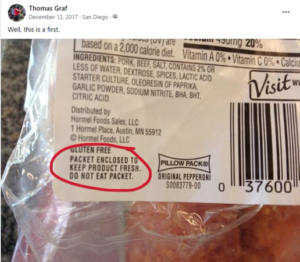
In my college years I made a handful of startling discoveries, but none quite like this label on the back of a packet of pepperoni:

Underneath this Facebook post, one of my friends commented, “If there’s a warning, that means someone’s done it.”
My next thought was a mixture of disbelief and despair: are there actually rational (or at least literate) humans who have tried to eat food packaging? Are there more who would happily do so unless headed off by an explicit warning label?
I thought of that day recently upon encountering an internet atheist slogan you’ve probably heard some version of before:
“If you need religion to be a good person, you aren’t a good person.”
The atheist’s deeper point, if I understand him, is that being a good person isn’t that hard; so if you need divine aid to keep you from killing or stealing, then your morals are as defective as the intellect of someone who needs explicit instruction to keep him from, say, eating plastic. The slogan isn’t arguing for or against God; it’s a smear, meant to make Christians feel stupid, or evil. Something is wrong with you.
The Christian’s response should be: Yeah, I know. I need to work on it.
The world, of course, is not full of plastic-eaters, but there are more than a few murderers, thieves, and overall “bad people.” In fact, there are a few billion of us who could use several stark warning labels to remind us continually that there’s something wrong with us. I don’t want to kill anyone, but I have faults. I sin. And sometimes I don’t realize my sin until God calls it out in words that sting like cold water to the face: “But I say to you that every one who is angry with his brother shall be liable to judgment; whoever insults his brother shall be liable to the council, and whoever says, ‘You fool!’ shall be liable to the hell of fire” (Mt. 5:22).
Rather than damaging Christianity, the slogan functions as half of Jesus Christ’s message: You need help. “Those who are well have no need of a physician, but those who are sick.” Omitted, of course, is the second, more important and more joyous half: I am your help. “I came not to call the righteous, but sinners” (Mark 2:17).
I can’t say I expected him to call me through my six-year-old post about food packaging. He’s full of surprises.

